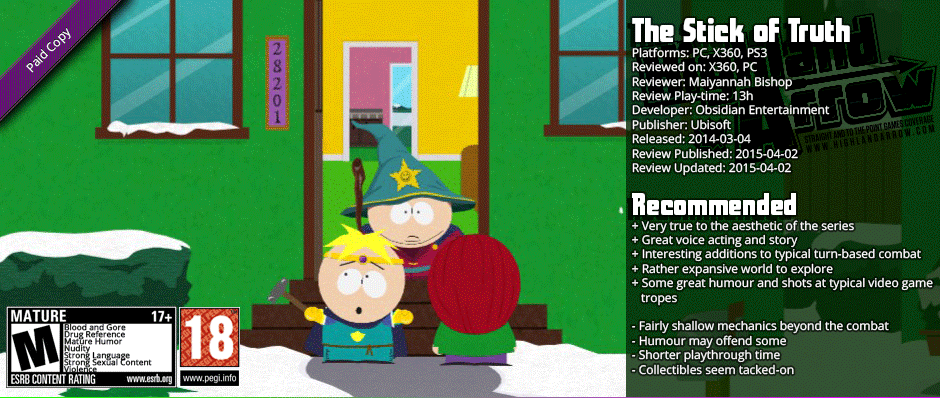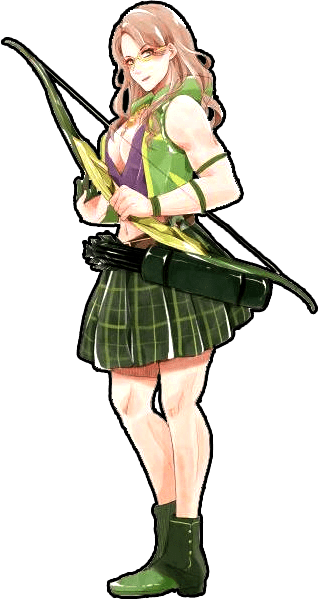

South Park - The Stick of Truth is a RPG video game adaptation of the popular television series, developed by Obsidian Entertainment and published by Ubisoft. Obsidian Entertainment is something of a developer I've always had something of pity for: they show a great deal of creativity and flair for their writing, but their greatest works, such as Knights of the Old Republic 2, have always been half-finished and pushed out early as a result of deadlines being pushed. Stick of Truth seemed like a game that might never have seen the light of day, given it's own deadline was pushed back again and again, but it did eventually come to us, about a year ago today, and the game that we got was all the better for it. With the Stick of Truth, Obsidian Entertainment has proven to us that given the time to do so, they can produce a brilliantly-written and well-designed game. It's almost a shame it was a South Park game, not that I really have anything against that series, but just that the game where Obsidian got to finish what they started is one that might not reach everyone in their audience. The South Park humour can be off-putting to some.
The creative writing really shines in Obsidian's faithful adaptation

The South Park series has a long and storied history of being controversial with its various depictions across the years, and as such many people were wondering if Stick of Truth would "play it safe" back in the olden times when the game was first announced. Now having it in front of us it's fairly obvious that the game pulls no punches in that regard, and those fears were unfounded. Every raunchy and low-brow trope from South Park gets at least a nod in the game, from toilet humor to sodomy to the most popular shots the series took at popular figures, including Al Gore and others. It's all here in debatable glory, and presented in the same look and animation style of the television show as well. That the game has managed to recreate that so faithfully is certainly laudable: it takes a lot of skill and talent to properly recreate a certain type of animation so close to it's source, to say nothing of how well the game keeps to the witticisms and general writing style employed on that titular show.
So let's address the elephant in the room, now, then: I would not really call myself a South Park "fan" - it's something that I watch only occasionally, and I find the humour very hit or miss. I could say the same of the game, for the most part, and certainly, if you are turned off by the brand of comedy that South Park has always had to offer, then this game is most likely not up your alley to say the very least. This is a game for fans, certainly, a love letter to them, in fact, as it's obvious that a lot of time and thought has been given to recreating that certain appeal, in you can tell the developers were very much into it themselves. As I said, the cracks the game makes are very hit or miss when it comes to the raunchier stuff for me, but I find it difficult to fault the game for it, because its something that resides in the source material, but I will say the jabs the game makes at the typical tropes of role-playing games and the like got some chuckles and smiles from me. Nothing that I would say is genuinely "laugh out loud" funny, but I would say other than the occasional cringe with a few jokes, I would say I was more quietly bemused than anything else throughout the game, and I certainly can't say I didn't enjoy it. Given that I'm not that hot on the TV series, that alone seems worth note.
Porting is technically quite solid, though thin on options
Granted, this is a straight-port, which is to say, nothing in here has been reconsidered for PC. The interface is very console, there's (thankfully very brief) loading screens probably every few minutes, and the control scheme is pretty much a straight remap to keyboard, though I will say that the controls on keyboard/mouse actually feel better to me than the controller ones, which are fiddlier I found. Stick of Truth's PC port is quite technically competent though - working on all sorts of resolutions, perfectly fine with multiple monitors, and a solid if sadly fixed 30 FPS, though one suspects the latter is a technical side-effect of the animation method and is in that sense somewhat understandable. The only thing I find truly at fault in that respect is the fact that the game couple use a few more options. For example there is a full-screen toggle, which goes between a normal window and full-screen, but it's not a border-less windowed mode, which will lead to problems for some people, in particular if people using an external streaming method such as a capture card want to stream the game. Any of the options akin to that I can think of are not game-breakers by any measure, but they would only add to the game if they were there. In short: it's a solid PC port, but it's a purely technical one, and doesn't adapt any of the interface to the platform beyond what is necessary.
Mechanically, the game is simple but functional, with some interesting twists
The game is basically the kind that would typically fall in the very large umbrella of "action adventure" were it not for the typical item procurement and turn-over and traditional turn-based combat that typically exemplify old-style RPGs. It's rather shallow in either case, but there are some efforts to offer a little more than the rote usual with the combat. For example, the typical "elements" rock paper scissors of the magic in turn based RPGs has been given a flourish with the same crass low-brow humour of the rest of the series (some statuses include things like "grossed out" and the like), and the attacks are kept somewhat dynamic with QTEs comprising them that does add a measure of skill to the turn-based combat attacks, albeit even if the test is mostly just reflexive. Such makes for an interesting twist to the usual turn-based formula, though it also makes it mildly less accessible - with my bad hand for instance I found the QTEs rather a pain on the controller, which indeed is part of the reason I rather preferred the PC with mouse and keyboard, as the motions required there were much less strenuous and ergo less painful over extended play.
Beyond that, as I mentioned, the chief other mechanic is indeed very RPG - rummaging through every pot plant, cupboard, chest, and backpack for new items and gears. The junk gear in particular has some amusing quips in their attached descriptions, but it does little to salve the busy work and fuss of the typical vendor dump of junk, though at least the inventory is rather generous in size, at least. Other than those comedic flourishes though, its the same usual grind of incrementing numbers to make larger numbers, and min/maxing, and to be fair, while it makes its typical flippant jabs about that min/maxing as well as all the other tropes, it does do a good job of feeding that, with interesting synergies to be found and the like, if that's your jive.
The story is quite interesting actually, but rather short
Stick of Truth plays essentially like a South Park episode making fun of LARPing, telling the tale of the "Master Wizard" (Cartman) and his crew taking on a "new kid" (you) to recapture the "Stick of Truth" from the nefarious "Drow Elves" (Kyle and Stan) and their crew, and take part across the town of South Park. It's actually a rather interesting trek across the various little bits of South Park parody, including alien probing, homosexual humour, and more. it's rude, it's crass, and moreover, it's offensive, and it revels in it. It's an interesting roast of just about everything in popular culture, all held together very well in the frame of it's over-arching story of that whole LARP story, and Obisidian has pulled it off quite well, to be honest. It does a good job, I feel, of being offensive for the point of humour without being malicious, and the latter is when that kind of offensive humour becomes problematic, and Stick of Truth does a good job avoiding that one pitfall in particular.
If there's one criticism to be had of the story it's that the central premise - the fact that your player character is mute and therefore a bit of an unknown - is a joke that gets run with until the narrative has driven it into the ground, and then driven further. South Park has a bit of a habit of being a bit overbearing with the snipes it makes sometime, wearing them past the point of hilarity, which is why I tend to find it a bit hit and miss myself, and the game draws fairly constant attention to the fact that the player character doesn't speak. To be fair to the developers it never comes off as forced, but it does wear thin by the time you get to the pay-off, and the punch-line that it delivers for your trouble is probably not worth basically the entire game's worth of build-up, whereas it's given at the end of the game, basically.
Many of the optional mechanics seem tacked on
That really is the main problem I have with Stick of Truth on a mechanical level: much if not all of the optional mechanics seem tacked on, arbitrary padding to a somewhat thin gameplay length for the price tag. That's not to say they're bad, but they're mostly pointless, the kind of thing to be pursued for 100% completion and little else. The optional side-quests at least have the benefit of padding experience, although it caps out at a max level I reached before the end of the game regardless, but things like the "Chinpokemon" collectible toys have no point to them whatsoever: collecting all of them has no in-game benefit, short of that endless pursuit for 100% completion. Same with "friending" anyone beyond the ones you need to, to complete the plot as with the side-missions: you do get additional abilities out of it, but it has a cap that you can reach before the end of the game even just on the main story campaign, or I did anyways, without much effort in seeking out side quests, merely taking the occasional one that I came across, and leaving many that I couldn't be bothered with unfinished.


